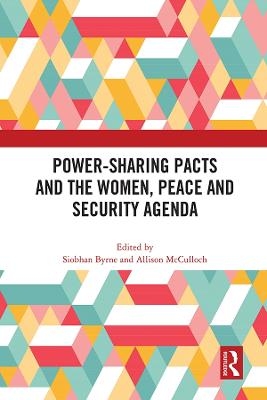
Power-Sharing Pacts and the Women, Peace and Security Agenda
Routledge (Verlag)
978-1-032-14876-2 (ISBN)
Championed by national governments and international organizations over the last two decades, power-sharing and feminist scholars and practitioners tend to view them as opposing norms. Critics charge that power-sharing scholars cast gender as an inconsequential political identity that does not motivate people like ethnonationalism. From a feminist perspective, such thinking serves the interests of ethnicized elites while excluding women and other marginalized communities from key sites of political power. This edited volume takes a different tack: while recognizing the gender gaps that still exist in power-sharing theory and practice, contributors also emphasize the constructive engagements that can be built between ethnopolitical power-sharing and gender inclusion.
Three main themes are highlighted:
The ‘gender silences’ of existing power-sharing arrangements
The impact of gender activism and advocacy on the negotiation and implementation of power-sharing pacts in divided societies
The opportunities for linkages between power-sharing and the women, peace and security agenda.
The chapters in this book were originally published as a special issue of the journal Nationalism and Ethnic Politics.
Siobhan Byrne is Associate Professor of Political Science and Director of the Certificate in Peace and Post-Conflict Studies at the University of Alberta, Edmonton, Canada. Her teaching and research focus on post-conflict transitions to peace, feminist anti-war activism and feminist interventions in International Relations. Allison McCulloch is Associate Professor of Political Science at Brandon University, Manitoba, Canada. Her research considers the design of power-sharing arrangements, their incentives for moderation and extremism and whether they can be made more inclusive of identities beyond the ethno-national divide.
Introduction: Is Power-Sharing Bad for Women? 1. Power-Sharing, Conflict Resolution, and Women: A Global Reappraisal 2. Navigating Consociationalism's Afterlives: Women, Peace and Security in Post-Dayton Bosnia-Herzegovina 3. The Impact of Women's Activism on the Peace Negotiations in Cyprus 4. Female Party Attachment in a Power-Sharing Polity: The Erosion of Protestant Support in Northern Ireland 5. Between Co-Option and Radical Opposition: A Comparative Analysis of Power-Sharing on Gender Equality and LGBTQ rights in Northern Ireland and Lebanon 6. Allies or Opponents? Power-Sharing, Civil Society, and Gender 7. The Feminist Institutional Dimensions of Power-Sharing and Political Settlements
| Erscheinungsdatum | 01.12.2021 |
|---|---|
| Verlagsort | London |
| Sprache | englisch |
| Maße | 174 x 246 mm |
| Gewicht | 453 g |
| Themenwelt | Geisteswissenschaften ► Philosophie |
| Sozialwissenschaften ► Politik / Verwaltung ► Europäische / Internationale Politik | |
| Sozialwissenschaften ► Soziologie ► Gender Studies | |
| ISBN-10 | 1-032-14876-4 / 1032148764 |
| ISBN-13 | 978-1-032-14876-2 / 9781032148762 |
| Zustand | Neuware |
| Haben Sie eine Frage zum Produkt? |
aus dem Bereich


